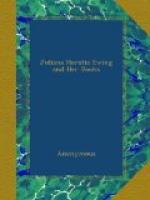As they rode together in search of the Dog:
Aldegunda thought to herself—“We are so happy, and have so much, that I do not like to take the Blind Man’s dog from him”; but she did not dare to say so. One—if not two—must bear and forbear to be happy, even on one’s wedding-day.
And, when they reached their journey’s end, Lazarus was no longer “the wretched one ... miserable, poor, and blind,” but was numbered amongst the blessed Dead, and the Dog was by his grave:
“Come and live
with me, now your old master is gone,” said the
young man, stooping
over the dog. But he made no reply.
“I think he is dead, sir,” said the gravedigger.
“I don’t believe it,” said the young man, fretfully. “He was an Enchanted Dog, and he promised I should have him when I could say what I am ready to say now. He should have kept his promise.” But Aldegunda had taken the dog’s cold head into her arms, and her tears fell fast over it.
“You forget,”
she said; “he only promised to come to you when
you
were happy, if his old
master was not happier still: and perhaps—”
“I remember that
you always disagree with me,” said the young
man,
impatiently. “You
always did so. Tears on our wedding-day, too!
I
suppose the truth is,
that no one is happy.”
Aldegunda made no answer,
for it is not from those one loves that
he will willingly learn
that with a selfish and imperious temper
happiness never dwells.
The “Blind Man” was inserted in the Magazine as an “Old-Fashioned Fairy Tale,” and Julie wrote another this year (1876) under the same heading, which was called “I Won’t.”
She also wrote a delightfully funny Legend, “The Kyrkegrim turned Preacher,” about a Norwegian Brownie, or Niss, whose duty was “to keep the church clean, and to scatter the marsh marigolds on the floor before service,” but, like other church-sweepers, his soul was troubled by seeing the congregation neglect to listen to the preacher, and fall asleep during his sermons. Then the Kyrkegrim, feeling sure that he could make more impression on their hardened hearts than the priest did, ascended from the floor to the pulpit, and tried to set the world to rights; but eventually he was glad to return to his broom, and leave “heavier responsibilities in higher hands.”
She contributed “Hints for Private Theatricals. In Letters from Burnt Cork to Rouge Pot,” which were probably suggested by the private theatricals in which she was helping at Aldershot; and she wrote four of her best Verses for Children: “Big Smith,” “House-building and Repairs,” “An Only Child’s Tea-party,” and “Papa Poodle.”
“The Adventures of an Elf” is a poem to some clever silhouette pictures of Fedor Flinzer’s, which she freely adapted from the German. “The Snarling Princess” is a fairy tale also adapted from the German; but neither of these contributions was so well worth the trouble of translation as a fine dialogue from the French of Jean Mace called “War and the Dead,” which Julie gave to the number of Aunt Judy for October 1866.[29] “The Princes of Vegetation” (April 1876) is an article on Palm-trees, to which family Linnaeus had given this noble title.




